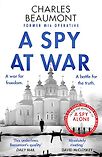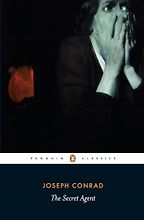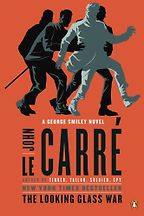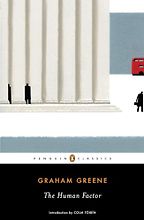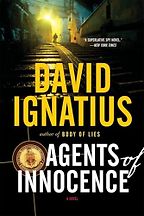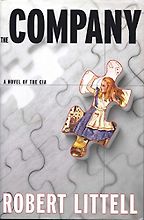I’m curious about your choice of topic, spy novels based on real events. Are novels based on things that actually happened the best kind of spy book, in your view?
Well, I certainly think people who have some knowledge of the spying world prefer them, because the gap between reality and fiction in the espionage world can be huge. There’s the very dramatic, terribly exciting James Bond genre, which is complete fantasy.
I suppose there are two camps within spy literature. There are people who write books that at least aim to be realistic and perhaps based on something real, and those who don’t at all and write exciting fantasies. And I wouldn’t say one’s better than the other, but I’m certainly in the former camp.
What I love about realistic spy novels is that you learn about geopolitics—which I’m interested in but can be quite boring to read about. You find out, say, what happened in Bahrain during the Arab Spring.
Yes, I agree. That was one of the motivations for me to start writing fiction, the realization that there’s so much happening in the world that people want to know about. Working one’s way through, say, the Economist is very worthy but can feel like homework.
You’re alluding of course to The Peacock and the Sparrow by I.S. Berry, which is a brilliant novel. Bahrain was a very significant story in the Arab Spring, but one that you don’t hear much about, because other things have come along, I suppose, particularly the civil war in Syria. That’s a great example of how you can read a novel and, in a way, learn more than you would ever learn from doing your homework with the Economist.
Are a lot of spies turning into novelists?
Well, I wouldn’t say a lot, but there seems to be a little bit of a tendency. We’ve mentioned I.S. Berry. The other very prominent current author from the CIA is David McCloskey. He’s published three books now and there’s a fourth on the way. They’re all set in the present day, are very realistic, and give quite an insight into how the CIA works.
Here in the UK, it’s a bit different, not least because the government makes it very difficult for people who’ve worked in that world to write books. But there are one or two. There’s Alan Judd, who’s a slightly older generation. He’s a novelist I regard very highly, who served in various roles in British government circles. Will there be more? I don’t know.
Let’s go through the books you’re recommending. So first up, you’ve got a novel from 1907. This is The Secret Agent by Joseph Conrad. Can you say a bit about the book, what event it’s based on, and why you like it?
The Secret Agent by Joseph Conrad may be one of the first espionage thrillers. That’s something we could argue about, but it’s a very early example. It’s about anarchists in London at the turn of the century.
The character at the heart of the book is instructed by his handler—a sinister foreign agent based in Britain, we don’t really know who they are—to go and plant a bomb at the Greenwich Observatory, an important landmark in London to this day. And without giving too much away, it all goes wrong. It’s tragic but it’s got a dark humor, which people who are fans of Joseph Conrad will be familiar with. It also explores a lot about the world of espionage—the manipulation, the betrayal.
The story it’s based on is a French anarchist, Martial Bourdin, who in 1894 died gruesomely when he was walking towards the Greenwich Observatory. People believe that he was probably trying to plant a bomb.
At that time, anarchism was a serious global terror movement. It has some similarities with the violent Islamism of Islamic State, in the sense that its political goals were quite hard to understand. But it carried out violent attacks aimed at the pillars of civilization in Western Europe at that time.
There were also allegations that anarchism was being exploited by hostile powers. So, the people carrying out these attacks may have been deluded extremists, but they were being manipulated by unfriendly foreign governments. That’s something that to modern ears might sound like a very familiar story.
Even if it had no basis in reality, it would be a really interesting, brilliant book. But it also tells us about a period of turbulent European history that many of us have forgotten.
Let’s go on to the next book you’ve chosen, which is from 1965. This is The Looking Glass War by John le Carré. Is this a good le Carré?
The first thing to say is that it did not enjoy huge success on publication. It came out after The Spy Who Came in from the Cold, which was le Carré’s real breakout book. He’d written a few before, but that was the one that was a massive global bestseller and made him a household name, both here and in America. If you read The Spy Who Came in from the Cold, it’s a fairly bleak, rather tragic book. But le Carré felt that in spite of its reception, some people hadn’t really got the book. They thought that it was a heroic story, whereas he felt that it was a story about the futility of a lot of espionage work. So he wrote The Looking Glass War, almost as a corrective for those who had seen heroism in The Spy Who Came in from the Cold.
So The Looking Glass War is a very, very bleak story. Again, it’s darkly humorous, but the humor is buried quite deep under this bleak tale of a completely incompetent intelligence operation that is mounted by a small intelligence service in Britain. It’s not MI6, it’s a second-order organization that in le Carré’s novel had survived World War Two and is trying to prove its relevance in a post-war world.
I think it may be le Carré’s best work. The bleak emptiness of the motivations really says something about the cynicism of the world of espionage, particularly, perhaps, in the early period of the Cold War. There was a brutality to it and a coldness to the way that spymasters in places like London carried these operations out. A lot of people were betrayed in operations that had no real utility at all.
In terms of the specific events in The Looking Glass War that may have a historic resonance, there are a couple:
One is a very strange story from 1956 when a Russian ship was visiting Portsmouth Harbour. Although it was the early years of the Cold War, it was a quasi-diplomatic visit, certainly not a hostile one. A man called Buster Crabb—who had been a heroic Navy frogman during World War II but was long since retired and probably no longer in great shape—was sent on a strange mission, which to this day no one’s quite sure what on earth the purpose really was. It was basically a suicide mission, and his body was discovered later. It caused a bit of a diplomatic incident. But as a futile, pointless venture that cost the life of the operative but seemed to gain nothing for Britain, it was emblematic of this rather chaotic and amateuristic period of the early Cold War. So that’s one of the possible inspirations for le Carré’s novel.
There were others in the early Cold War. For example, agents were sent to Albania—where the Cold War was still a hot war—with no sense that they had any chance of achieving anything. It’s almost as if they were being sent to their death to make a point on a global scale.
I think it was these futile and costly operations that seem to have inspired le Carré in writing this book.
And was there a mini-Cuban missile crisis with possible missiles in East Germany, or is that fiction?
There are resonances of the Cuban Missile Crisis, which came later. The threat that such a thing might happen was always on the minds of Western leaders and their intelligence services. To my knowledge, the specific high-level threat that’s alluded to in the book probably wasn’t there, but it’s a very believable one. It’s something that intelligence agencies would have wanted to keep an eye on.
The other aspect of the book is the bureaucratic maneuverings. The tragic outcome seems less important to the head of the intelligence service than getting the bureaucratic upper hand.
Yes. There’s a wonderful bit where, because this secondary intelligence service has managed to get its toe into the door of bigger operations, the head of the service gets a slightly different car to be driven around in.
The endless bureaucratic jockeying for position and the turf wars are based on reality because they happen constantly to this day and in all humanity. In that sense, a book about bureaucrats scheming is endlessly relevant. We see it in the writing of Mick Herron and Len Deighton. A lot of espionage fiction takes that side of things and brings it to the reader.
Now we’re at The Human Factor by Graham Greene, which is from 1978. Tell me about this one.
This is a really interesting book. Graham Greene briefly worked in MI6 during World War II in West Africa, if I remember rightly. His most famous spy book is Our Man in Havana, which is a great comedy and quite light—not as bleak as the books I’ve suggested. But The Human Factor is again—and perhaps this is a bit of a theme—quite a tragic book. It’s about a man who works for a secret service and is definitely not James Bond. Quite the contrary. He’s a quiet bureaucrat who commutes to work and is a family man.
Elements of this man’s story are unusual. Specifically, his wife is a black South African at a time when the country was under apartheid. The story unfolds, and it’s about a mole hunt within the Secret Intelligence Service at a time, of course, when such things were very real and very visceral.
The way in which this story draws specifically on real events is Graham Greene’s own relationship with Kim Philby, who was the great mole par excellence whom the Russians succeeded in inserting into British intelligence. Kim Philby was the greatest of ‘the Cambridge Five’ in terms of the amount of damage that he caused and the degree to which he achieved a high level within British intelligence.
Later, after he had been exposed—that’s a long story and not relevant to this book—Philby defected to the Soviet Union. He lived in Moscow and was given status by the Russian authorities, but without real trust. I think most people agree that his life was pretty miserable in Russia and that he missed home terribly. He would beg people to bring him marmalade and copies of the Times. He was always wanting to know about the cricket score. It’s a classic example of someone who devoted their life to the service of a foreign state, but when he was actually forced to live in that state, didn’t fit in at all.
Graham Greene kept in touch with Philby after his defection. Philby was, by definition, a traitor. Had he come back to Britain, he would almost certainly have faced imprisonment, and he was certainly a disgraced person. Greene’s decision to stay in touch with him was quite controversial. It’s notable that John le Carré, who was of a similar generation, refused to meet Kim Philby when he was in Moscow.
What do we learn from that about Graham Greene? In a way, the title of the book, The Human Factor, suggests that for Greene, the loyalties are individual and to family. Without giving too much of the book away, it’s about the protagonist’s loyalty to his family above his country. And perhaps in le Carré’s world—although he’s often very critical and writes quite downbeat assessments of the work of intelligence services—ultimately, there is a fairly traditional patriotism at the heart of what he writes. In a way, Graham Greene is questioning that, and perhaps that’s reflected in the relationship that he ended up having with Philby, even after Philby had been disgraced.
Okay, before we get to your last two choices, I wanted to ask about your own writing. Given that you like novels based on real-life events, to what extent are your own books based on your experience as an intelligence operative?
It’s a good question. Obviously, the work that I did in that world informs my understanding of it, and some of my writing might be based on actual experiences of surveillance and counter-surveillance. One thing I would say, though, is that my books are set in the present day, and I haven’t been in that world for more than a decade as a professional participant. I wouldn’t want anyone to think that I’m writing about what MI6 is up to in 2025. And as people who read my books will know, my protagonist is also someone who’s on the outside. He is a former intelligence officer, rather than a current serving one.
The book that’s due out this week, A Spy at War, is very heavily based on current events. I wrote it about a year ago, but as the Ukraine situation evolves—including what I certainly regard as a betrayal of Ukraine by the United States and Donald Trump and his people…it’s something which I anticipated in the book, to some extent.
Really? Please explain!
I don’t want to give away too many spoilers, but in the book, I write about the ways in which Russian disinformation is being used to try to undermine support for Ukraine. Some of the protagonists in the book are focused on Britain, but towards the end, some of them start to imagine that they can achieve more by focusing on the US. It was very much in my mind that if Trump came back to power, people might be reading this book at a time when the betrayal of Ukraine was unfolding. It gives me no pleasure to see that happening.
Did you go to Ukraine? In A Spy at War, you’ve got some good descriptions of operations going on there.
I have spent time there since the war began, so quite a lot of it is based on first-hand knowledge. I also know a lot of people who have worked there, including Ukrainians in the military. I’ve been able to draw on both my own experiences of traveling around Ukraine in war and also the people I know who have spent more time there.
So a few years ago, somebody was at our house talking about what sounded like a crazy theory. And then, when I was reading A Spy Alone, that very story came up again. To what extent was that book based on real events?
So my first novel, A Spy Alone, is about a group of spies, a bit like the Cambridge Five I alluded to earlier, but being recruited in the 1990s in Oxford. And yes, there are theories out there. I want to clarify that I sat down and wrote the story as it came to me, as a work of imagination, but I was aware that the rumors existed. I didn’t take a theory and then write the story, but I’m aware of what’s out there.
So the book is a work of my imagination, but I hope it feels realistic in the sense that there are people in our society who have these strange relationships with Russia, whose loyalties it’s hard to fully understand. Also, we know that Russia has persistently sought to interfere not just in Britain’s politics, but in the U.S., France, Italy, Romania, you name it. In a way, it’s not a surprise that it’s possible that some of the things that I describe as fiction might have happened in real life.
And to what extent is Simon, the main protagonist, you? Are there autobiographical elements?
I think my life is more enjoyable and pleasant, and that I have better relationships and all that sort of thing. But I think the world view that he has—which is a bit cynical and informed by the betrayal and dishonesty that’s at the heart of espionage—I probably share some of that. It’s a necessary part of it; I’m not making a judgment. I’m just describing it.
The books are only very slightly autobiographical, I’d say.
We’d better go on to the next book, Agents of Innocence (1987) by David Ignatius, which is about a CIA agent in the Middle East. I haven’t managed to read this one yet, so please fill me in.
This book is really interesting. It came out in 1987, and the events it depicts are from the early 1980s when the civil war in Lebanon was at its peak. People will remember there were two huge bombings that targeted the US in Beirut, one a Marines barracks, and another the embassy. The US Embassy bombing is the dramatic event at the heart of this story.
Now, the book, again, is a novel. It depicts a fictitious character, Tom Rogers, who is a CIA officer working in the Middle East. But it is well attested that the book is based on a real CIA officer who died in the embassy bombing in Lebanon. It is also well attested that this book is given to CIA recruits as a training read when they first join the organization, as a depiction of the work of a human intelligence officer, someone whose job it is to cultivate and recruit sources. It’s a brilliant book and it’s no coincidence that it’s had a kind of official endorsement from the CIA itself.
It’s a book that is all about nuance. It’s all about whether someone is working for you and whether you can believe them. What is intelligence about? What does it mean to have a recruited source? What might any of that mean, and what, in the end, does it deliver? If people are interested in the world of spying in its more classic sense, I can’t think of a better book about human intelligence.
That’s quite an endorsement. Is this book depressing as well?
There’s a bit of a theme here, isn’t there? I don’t know. It’s certainly a bit tragic. It’s a book about moral ambiguity and perhaps one can be depressed by that. But there aren’t many goodies and baddies in real life. We waste so much time in this search for the morally right or the morally wrong—but we all inhabit a world where everything is in these complex shades.
As your last choice, we’ve got quite a doorstopper. This is The Company by Robert Littell, which really does interweave fact and fiction.
The Company is the book that is most obviously based on real events. He effectively writes a history of the Cold War. The subtitle is ‘a novel of the CIA’, and it really is the story of the CIA and the Cold War.
It’s got this epic quality. Coming back to this idea of using fiction as a means of understanding real life, you could read this as a history student and end up with a really good knowledge of all the big events: the Bay of Pigs, the 1956 uprising in Hungary etc.
It’s also a mole-hunt novel, which is a classic espionage fiction trope. There’s an intriguing side to all this, because there’s long been an idea that, just as Britain faced its challenges with the Cambridge Five, most notably Kim Philby, the US would have had similar moles buried deep inside its establishment.
The CIA did uncover Soviet moles, but the nature of them never matched the ideological recruits who spied for decades in Britain. Aldrich Ames was one famous case, but he was recruited by being paid a lot of money and spied for a fairly short period of time before he was discovered. So whether or not there was a long-buried mole in the CIA who was never discovered throughout the Cold War is one of those things people speculate about.
This book constructs an extraordinary narrative, drawing in a huge number of real characters—Robert Kennedy Sr, James Jesus Angleton, etc. There are a lot of fascinating characters in the book. And, in fact, some of the characters who are fictitious—as in their names are not of real people—are still closely based on real CIA officers whose stories can be found online.
So it’s a really great book in the sense of being one of these epic stories that tells you a lot, but it’s also a brilliant mole hunt story. The way the investigators eventually catch the mole has got so much ingenuity to it. It’s got that fascinating element that great mole hunt stories have. Tinker, Tailor, Soldier, Spy is perhaps the classic, but this book nearly measures up to it in terms of the ingenuity and the fact that that as you go along, you sort of know, or think you know, who it might be, but it’s still shocking when you find out right at the end.
And is Robert Littell a former spy?
No, he’s a well-known American novelist who has written a number of novels about that world. I imagine he’s got lots of connections and reach into it, but to my knowledge, he himself hasn’t served in the CIA.
Five Books aims to keep its book recommendations and interviews up to date. If you are the interviewee and would like to update your choice of books (or even just what you say about them) please email us at [email protected]
Five Books interviews are expensive to produce. If you've enjoyed this interview, please support us by donating a small amount.

